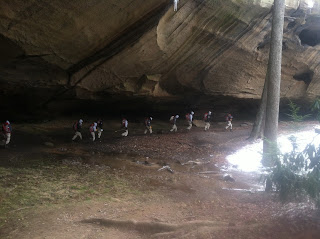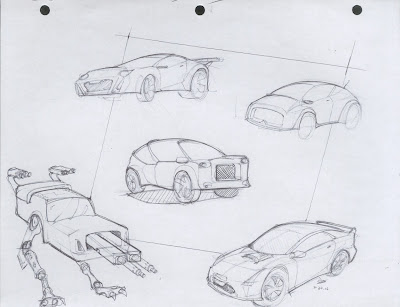It's been a long 10 months. Graduation on April 27th was bittersweet, but mostly sweet. I can't say I'm sad. That's not because I couldn't wait to escape, to be done with it all, to be free. Though that's all true – you try sleeping, eating and working together in close proximity with 8 to 10 to 150 other people 24/7 for ten months and see how you feel the first night you sleep in a room alone. Seriously though, try it. It's been the best, most difficult, most rewarding and defining experience of my life.
For
many of us our AmeriCorps experience was a continuing process of
coming of age. This program is at its most basic level a bunch of
young people trying to figure themselves out while helping strangers.
Every successful person has to figure out who they are at some point,
and I can't think of a much better way to do that than through
service. Fortunately for me, I'm far from the only one who feels that
way.
I
will never forget the people I met during my time with AmeriCorps and
how we encouraged, challenged, and occasionally swore at each other.
Though some of us may see each other in the future we'll never be together
with all the same people in the same context ever again, as one of
the keynote speakers at graduation pointed out. What was AmeriCorps
NCCC Class 23 no longer exists, but it doesn't make me sad. There is
a time and a season for everything. As this phase reaches its
determined end, another begins, enlightened and shaped by the
experiences of all those prior to it. Though our relationships won't
and can't ever be the same, I will always remember with gratitude the
people and places of this year by the lessons they taught me and the
ways that they changed me.
I
read a reflection at our pre-graduation awards ceremony which I think
sufficiently sums up how I feel about this experience, so I'll
include that at the end of this post. But first, a couple other
thoughts from the year.
There's
an important topic that we weren't allowed to talk about while still
in the program and which many of my friends are speaking out on now
that we've graduated, to which I'd like to add my voice. That topic
is the issue of AmeriCorps' continued funding under the budget
proposed by the new administration which is currently under review.
This
budget calls for the elimination of the Corporation for National and
Community Service, the organization that oversees AmeriCorps NCCC and
thousands of other AmeriCorps positions around the country. Though
everyone pays a different amount on tax day, on average CNCS costs
taxpayers $3.37 a year toward its total budget of $1.1 billion. That
works out to just over .03% of the 2016 US budget of about $3.267
trillion. The military budget, conversely, is slated to receive a
significant increase.
We
spend astronomical amounts of money on our military, and we should
be supporting them with the best training and tools we have
available, now more than ever. But the military exists to protect our
country's peacetime freedom to make the best lives possible for
ourselves and our neighbors. AmeriCorps is a program that changes the
lives of its participants nationwide and inspires nearly everyone who
comes across it to improve themselves and their community while
accomplishing tangible, quantifiable good for the recipients of its
aid. I think it would do our military a great disservice to cut what
relatively little support the government gives to improving the
country they are trying to protect through developing civic service,
compassion, and responsibility in every day civilians.
I
don't even know if there's anything I can do to help save the
program, other than add my voice to those of us who've seen it
firsthand and understand how invaluable it is. The more people are
talking about the same thing, the more likely we are to be heard by
the powers that be. There are people who are working to make the idea
of service so ingrained in our culture that a politician wouldn't
dare run for office if they hadn't completed their service year in
their youth. Elimination of AmeriCorps would be a major blow to that
goal.
History
has proven that nothing but popular mass and momentum can advance
worthy causes through political red tape, greed, ideological
stagnation, whatever the obstacle may be. It's not going to be done
by one impassioned speech delivered by a brave civic champion to a
rapt and attentive Congress - the proverbial somebody else, somewhere
far away. If that oration ever happens and I sincerely hope it does,
it will mean nothing without the support of a very large number of
people behind it, people like us.
I
would encourage anyone reading this to talk about your experience, or
your friend's experience, or your son or daughter or niece or
nephew's experience with AmeriCorps as much as you can, even if you
don't think it's a perfect program. I sure don't, and it never will
be. But it's a monumental step in the right direction. I have no
doubt that if allowed, AmeriCorps will continue to pay dividends
through its role in the formation and inspiration of every hopeful
individual it discharges into a country that now more than ever
requires us all to be engaged in lifestyles of service.
--
Since
I left NJ in July, I've been keeping a running list of interesting
names I've encountered during my travels. I shared many of these in
an earlier post, but the list has grown since then. The note I keep
open in my phone to track these was originally titled “Weird
Southern Place Names”, which later became “Pleasantly Odd
Southern Names” as I became steeped enough in the culture to rise
above finding unfamiliar appellations humorous and began to
appreciate their originality to me. I recently read in a book on the
mentality of survivors that nowhere new we go is strange or alien –
we are foreign and alien to it, and we bring all the strangeness of
it within ourselves. If we want to succeed in life it's up to us to
stay true to who we are while adapting ourselves to new
circumstances.
So
the list ended up being titled “Interesting Names” and includes
not just places but animals, rivers, towns, and people. I'm including
it because I think the story of the list's transformation is an
interesting metaphor for my own life and outlook over the last ten
months - but also because I still think a lot of it is pretty funny.
Interesting
Names So Far Encountered:
-McNutt
Street, WV
-The
Big Ugly community center, WV
-Shartlesville
-Funck's
Restaurant
-The
Pleasing Fungus Beetle
-Chunky,
MS
-Bland,
VA
-Chillhowie,
TN
-Lick
Creek Road, Beelick Knob, Red Lick Creek, and like 20 other flavors
of licks across Appalachia
-Big
Clear Creek, Rupert WV
-Loudermilk
(surname in a WV graveyard, Quietermilk nowhere to be found)
-The
French Broad River, TN
-The
Golden Ginger
barge, anchored at the port of Baton Rouge
-[What's]
Bracken [fo'?] Road, GA
-Triple
J Road, VA
-Ramblewood
Drive, GA
-Lumpkin,
GA
-Jimmy
Raines Road, GA
-Wetumpka,
AL
-Stinking
Creek Road, KY
-Bloodlettsville,
KY (boy I'll bet it was fun living there in the 1800's)
-Cheekwood
[Botanical Gardens], TN
-Dancyville,
TN
-Arkabutla
Lake, TN
-Nolichucky
River, TN
-The
White Crappie fish, native to MS
-Assawoman,
VA
Corps Member Training Institute and Round 1 - Vicksburg MS, Jackson MS, Baton Rouge LA
 |
| The fledgling Delta 1 about three days into our very first project, clearing brush for a children's safe house in Jackson. |
 |
| About two months after our four day stint outdoors in Jackson, we had become simultaneously the rulers and serfs of the box kingdom. A Delta 1 hand touched nearly every box in that warehouse. |
 |
| This Red Cross shelter, set up in a movie production warehouse, was one of our 6 (7?) housing scenarios in Baton Rouge. For a while, we moved every 4-5 days. |
 |
| Some of us were trained as forklift operators our first week at the warehouse. Forklift days were usually a lot of fun. |
 |
| Mucking and gutting was a little more difficult than driving a forklift. But apparently, not all of us felt that way. |
 |
| Delta 1 on one of our final days in Baton Rouge. |
 |
| Sunrises at the industrial park were just as spectacular as sunsets. |
Round 2: Rainelle WV
Lafayette:
 |
| By a twist of fate, we got to see our old sponsors, the Adventists, in Lafayette. |
 |
| At the Boys and Girls club in Lafayette. If I never mount another piece of drywall again, it will be too soon. |
 |
| Delta 1 in late January. |
Albany:
 |
| A relatively mild scene of the tornado damage in Albany. Photo: Carlos Perez |
 |
| The fire team taught me how to notch a tree and let me use this 25 HP saw for a while. Photo: Cyntya Uriegas |
 |
| At a day of service planned by our teammate and fellow corps member Carlos Perez and Lauren Stratton. Photo: Sky Yeatts |
 |
| A few of us slept in hammocks in February. Georgia winters are great. |
 |
| In true AmeriCorps fashion, we at last had an apartment for a couple weeks, but no beds. I could've bought an air mattress for ten bucks, but I really don't mind the floor. |
 |
| The Albany Relief and Recovery warehouse crew in March. |
The Red River Gorge:
 |
| Our first snowy day in the Gorge. It was 17 degrees our first night in tents. Some of us had never camped before. |
 |
| Pulling tires out of Swift Camp Creek. Photo: Nicole Allen |
- - -
 |
| At graduation on April 27th. |
There is a kind of education you can't find in books, school, or a nine to five job, the kind which I now consider more important than any degree. When I joined AmeriCorps NCCC I knew very little about people - what drives us, what we really need to live a satisfying life, and how a good community should treat its members. I spent most of this service year asking those kinds of questions, and I found an unexpected variation in the answers from people who grew up in different states, different communities, and even in different families just a couple blocks apart.
To me, that increased understanding has been the principal merit of serving with NCCC. This year I was one of many young people put together with others from every walk of life and taught how to understand each other. It was a real bumpy road, but we formed a uniquely diverse community amongst ourselves as we tried to support one another so that we could work together long enough to accomplish some tangible, lasting good for the communities we serve. In the process I learned a lot about myself - about weaknesses I didn't want to acknowledge and strengths I didn't know I had. I am a very different person today than I was last July.
This process has been anything but easy. The work has been challenging and maintaining a cohesive team was often even harder. I've been worn out, beaten down and pretty much always hungry - we've all had difficult days where for one reason or another we just wanted to quit, but for ten months everyone here has made it work, and we've done some amazing things.
We've distributed supplies, repaired trails, staffed shelters, gutted homes and built many more. We've slept in high school gyms, churches, summer camps, tent cities, warehouses and everything in between. Through our work from West Virginia to the Florida Keys, the Carolinas to Baton Rouge, we were able to bring hope and smiles to so many people in need, from disabled elderly citizens to kids in homeless shelters. As a cohesive NCCC community, and within our individual teams, we were often the ones there in the midst of it when someone needed help the most. Not someone far away on TV, or in the news - we were there. That is a feeling I will never forget.
I've gotten a thousand different answers to the questions I had at the beginning of this year, but there's a common thread. So if I could take only one lesson from those answers, it would be the memory of how it feels to collapse into bed, or a cot, or the floor, nearly every night for ten months knowing that no matter how difficult or stressful my day was, it was spent making someone else's day a little better - and that is a satisfying way to live.
I would like to say thank you to my friends, teammates, family, and anyone who has kept up with this blog. Your support and appreciation has helped me realize and develop the gift I've been given for writing (the same talent has obviously not been extended to my photography skills, so thanks to my teammates for allowing me to use their photos). I plan to do something with that gift in the future, though I'm not sure what yet. For now, I'm going to keep writing and learning as much as I can, beginning with some accounts of the two month road trip my brothers and I will be taking around the United States this summer before I go back to RIT to finish my senior year.
Thanks for following along! Til next time,
-Dan
"Trust in the Lord with all your heart, and lean not on your own understanding. In all your ways acknowledge Him, and He will direct your paths." ~ Proverbs 3:5-6
- - -
Thanks for following along! Til next time,
-Dan
"Trust in the Lord with all your heart, and lean not on your own understanding. In all your ways acknowledge Him, and He will direct your paths." ~ Proverbs 3:5-6

























